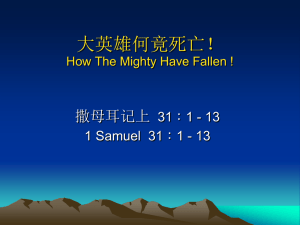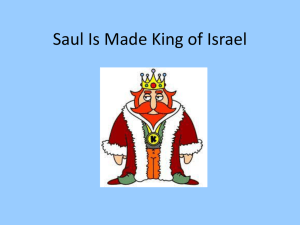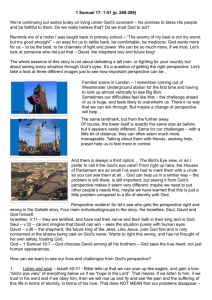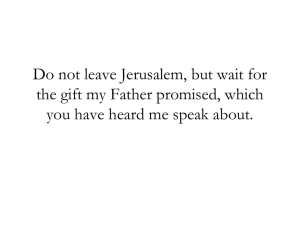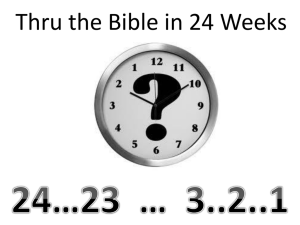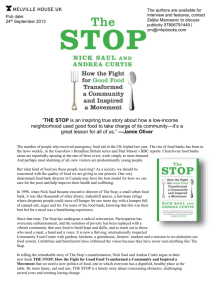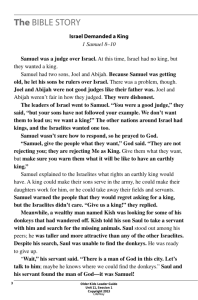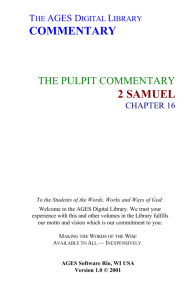David the shepherd boy (1 Samuel 16–31)
advertisement
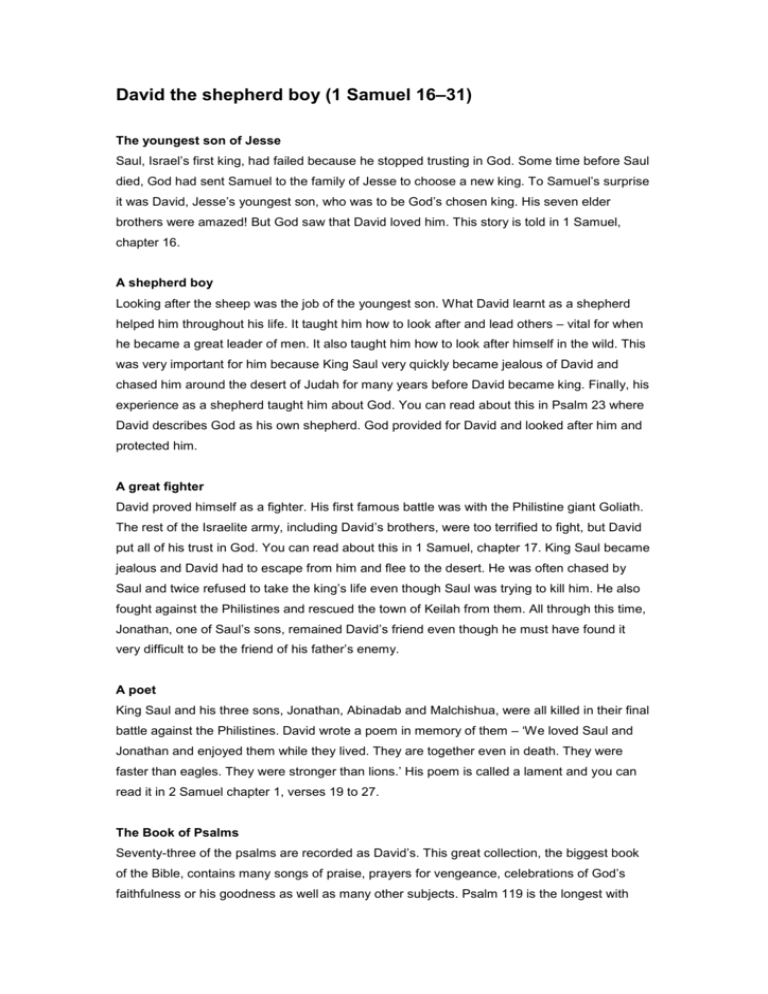
David the shepherd boy (1 Samuel 16–31) The youngest son of Jesse Saul, Israel’s first king, had failed because he stopped trusting in God. Some time before Saul died, God had sent Samuel to the family of Jesse to choose a new king. To Samuel’s surprise it was David, Jesse’s youngest son, who was to be God’s chosen king. His seven elder brothers were amazed! But God saw that David loved him. This story is told in 1 Samuel, chapter 16. A shepherd boy Looking after the sheep was the job of the youngest son. What David learnt as a shepherd helped him throughout his life. It taught him how to look after and lead others – vital for when he became a great leader of men. It also taught him how to look after himself in the wild. This was very important for him because King Saul very quickly became jealous of David and chased him around the desert of Judah for many years before David became king. Finally, his experience as a shepherd taught him about God. You can read about this in Psalm 23 where David describes God as his own shepherd. God provided for David and looked after him and protected him. A great fighter David proved himself as a fighter. His first famous battle was with the Philistine giant Goliath. The rest of the Israelite army, including David’s brothers, were too terrified to fight, but David put all of his trust in God. You can read about this in 1 Samuel, chapter 17. King Saul became jealous and David had to escape from him and flee to the desert. He was often chased by Saul and twice refused to take the king’s life even though Saul was trying to kill him. He also fought against the Philistines and rescued the town of Keilah from them. All through this time, Jonathan, one of Saul’s sons, remained David’s friend even though he must have found it very difficult to be the friend of his father’s enemy. A poet King Saul and his three sons, Jonathan, Abinadab and Malchishua, were all killed in their final battle against the Philistines. David wrote a poem in memory of them – ‘We loved Saul and Jonathan and enjoyed them while they lived. They are together even in death. They were faster than eagles. They were stronger than lions.’ His poem is called a lament and you can read it in 2 Samuel chapter 1, verses 19 to 27. The Book of Psalms Seventy-three of the psalms are recorded as David’s. This great collection, the biggest book of the Bible, contains many songs of praise, prayers for vengeance, celebrations of God’s faithfulness or his goodness as well as many other subjects. Psalm 119 is the longest with 176 verses, but others are quite short. The most famous one is probably Psalm 23, which begins ‘The Lord is my shepherd’. Shepherds Being a shepherd was a dangerous and lonely job, working in the fields for long hours. The shepherd led his sheep from one bit of grazing to the next, fighting off lions, bears and wolves which attacked the sheep. They were not thought of as important people and had a bad reputation for theft and violence. But shepherds did a useful job and the Bible often describes God as a shepherd, who faithfully looks after his people in spite of all difficulties. Music David was a singer, harpist and composer of psalms. He first went to King Saul’s court as a musician to entertain the king. We know very little about the music of those days but it was probably quite simple. In 1 Chronicles chapter 25 you can read about the musicians David organised to lead the worship of God in the Temple. Did you know? The Philistines were the main enemies of the Israelites right up to the time of King David, who finally destroyed them. They had settled on the south-western coast of Canaan before the Israelites arrived. They were very fierce fighters with better weapons than the Israelites. Their name gives us the word ‘Palestine’. David the king (2 Samuel) King in the making David, the shepherd boy, became leader of a band of outlaws, some of whom may have been robbers and murderers. They were disappointed in King Saul’s rule and were always on the run from him. Following Saul’s death, David was crowned king in Hebron, a city in Judah. David was a member of the southern tribe of Judah and it was the obvious place for him to choose as his base. He was thirty years of age. The way was soon paved for David to be king over the whole country. His rival, Ish-Bosheth, was Saul’s only surviving son but when he and Abner, the commander of his army, were murdered, no-one could offer a challenge to David any more. He moved his capital to Jerusalem, which is often called the City of David. A popular king David fought many wars and overcame all of the nations round about. He defeated the Philistines, the Ammonites and the Syrians. He also took the Ark of the Lord (or Ark of the Covenant), the symbol of God’s presence with the Israelites, to Jerusalem. It was carried in procession into the city and David and his people celebrated by dancing along the way. When it was safely in its place, David offered sacrifices to God and gave gifts of food to the people. In Jerusalem he built himself a palace and wanted to build a temple there, but God did not allow him to because he had killed so many people in battle. God promised that David’s son would build one instead, so David collected materials to be used in building the temple. You can read about this in 1 Chronicles chapter 22. Things get worse David also made mistakes and did many wrong things. One day he caught sight of Bathsheba, the wife of Uriah, one of David’s soldiers and decided he wanted to sleep with her so he arranged for Uriah to be killed in the front line of the battle and then took Bathsheba to be his own wife. The prophet Nathan accused him of wrong and David admitted his sin. His words of sorrow are recorded in Psalm 51. The time of rebellions David had set a bad example and his son Absalom plotted a rebellion against his father. You can read the story of Absalom’s rebellion in 2 Samuel, chapters 13 to 18. Another rebellion began under Sheba, but once again Joab, the commander of David’s army, put it down. David’s reign ended sadly with more bloodshed. He became very weak, but in his love for God he had been a ‘man after God’s own heart’. He is remembered as Israel’s greatest king. Joab In many ways Joab was David’s right-hand man. He helped to secure the throne for David and frequently led the army for him. He was a great fighter, but was ruthless and bloodthirsty. He killed Abner to help make David king of all Israel and he also killed Absalom in the rebellion against his father David. Family troubles David’s son, Absalom, wanted to take over as king so he tried to win the people over to himself. He half succeeded and many followed him so that David had to escape from Jerusalem to avoid being killed. Absalom was killed by Joab, the commander of David’s army, when he got caught in a tree by his hair. David was overcome with grief. David had several other sons and there was confusion about who would be the next king. In the end David ordered that Solomon, the son of David and Bathsheba, should be anointed king. Did you know? It was David who first made Jerusalem the capital. You can read how he captured it by surprise attack in 2 Samuel chapter 5, verses 6 to 10. It is sometimes known as the ‘city of David’. It was an easy place to defend because it was high up on a hill. Solomon built his temple there, so from then on it was where the king lived and where the main worship of God took place.
